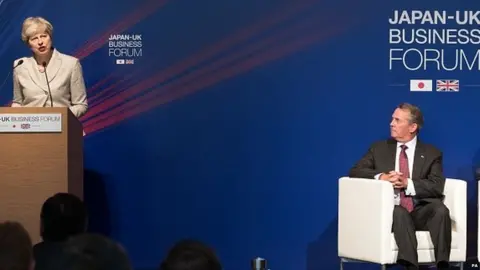Brexit: UK 'must not allow itself to be blackmailed'
The UK must not be "blackmailed" into agreeing a Brexit "divorce" bill before trade talks begin, Liam Fox has said.
Talks should begin soon "because that's good for business", the international trade secretary added.
EU negotiator Michel Barnier has said trade talks are still a way off, due to slow progress on other key issues.
The UK Brexit Secretary, David Davis, has warned that negotiations will be turbulent and disagreements over the divorce bill were "the first ripple".
Concluding the third round of Brexit negotiations on Thursday, both he and Mr Barnier made clear that the size of the UK's Brexit "divorce bill" remained a sticking point in talks.
The UK wants to begin trade talks and discuss the future relationship between Britain and the EU as soon as possible, saying it would benefit both sides.
However, Brussels insists that discussions about the future relationship can only begin once "sufficient progress" has been made on the "divorce bill" - the amount the UK will pay to settle its liabilities when it leaves the EU - citizens' rights, and the border between Northern Ireland and the Irish republic.
Speaking in Japan on Friday, Mr Fox was asked whether it was time for the UK to name its Brexit price.
He told ITV News: "We can't be blackmailed into paying a price on the first part (the divorce fee).

Blackmail or turbulence?
 PA
PAAnalysis by BBC political correspondent Iain Watson
Liam Fox undertook a range of broadcast interviews before flying back from Japan.
His accusation of "blackmail" featured only in the first of these. That suggests this wasn't a pre-scripted broadside.
Instead, it perhaps demonstrated frustration that, so far, the government's strategy of pushing for wider trade talks with the EU in the autumn hasn't been successful.
The aim was to persuade big EU trading nations to put pressure on the EU Commission to start trade talks after the October EU summit but it seems that the end of the year now looks a more likely timescale.
His colleague David Davis - a self-declared "determined optimist" - thinks that there could be more progress after German elections later this month.
Interestingly, he declined to repeat or endorse the international trade secretary's rather undiplomatic language - simply warning of more turbulence to come.

"We think we should begin discussions on the final settlement because that's good for business, and it's good for the prosperity both of the British people and of the rest of the people of the European Union."
Speaking to the BBC at the end of the three-day visit to Japan, Mr Fox said businesses were "getting impatient" and a willingness by the EU to negotiate on the future trading relationship now would "unlock some of the tension".
When asked about Mr Fox's "blackmail" remark, Mr Davis, who has been giving a speech in Washington DC, said he did not comment on other ministers' views.
But he added: "We are in a very difficult and tough, complicated negotiation. I have said from the beginning it will be turbulent. What we are having at the moment is the first ripple and there will be many more ripples along the way."
'Not a ploy'
Britain, which voted to leave the EU in June 2016, officially began Brexit talks on 19 June this year and is due to leave the EU on Friday, 29 March 2019.
Mr Barnier said that at the current rate of progress, he was quite far from being able to recommend opening parallel talks on a future trade relationship.
No figure has yet been put on the "divorce" payment, but European Commission president Jean-Claude Juncker has suggested it could come in at about 60bn euros (£55bn).
Writing in the Daily Telegraph on Friday, Belgian MEP Guy Verhofstadt, who heads the European Parliament's Brexit group, said the EU has been "fully transparent" about its negotiating positions and mandates since day one.
"This is not a ploy to derail talks, but an inevitable consequence of the Brexit decision," he said.
'Sabre rattling'
Labour MP Chuka Umunna, who works with the pro-EU Open Britain pressure group, said Mr Fox's comments were "sabre rattling from a trade secretary who is twiddling his thumbs because he cannot do anything until the trade position of the UK has been resolved with the EU".
The European Council is due to meet in October and will decide whether sufficient progress has been made on key Brexit discussions to allow negotiations to move on to trade and the UK's future relationship with the EU.
If it has not, as Mr Barnier has suggested, the next opportunity would be the council's meeting in December - meaning talks about the future relationship would be unlikely to begin before the end of the year.
Meanwhile the Home Office has told EU citizens in the UK, and UK expats in the EU, that "progress was made" in this week's negotiations on rights to healthcare, and the right of EU citizens to set up and manage a business.
The update said: "We agreed to protect the rights to reciprocal healthcare, including European Health Insurance Cards (EHICs), for EU citizens in the UK and UK nationals in the EU who are present on the day of exit.
"Both sides also agreed that the rights of cross border workers should be protected.
"On economic rights, we have confirmed the right of EU citizens to set up and manage a business in the UK, and the same applies to British citizens in their member state of residence," the Home Office added.
It also said it had apologised to about 100 EU citizens who received deportation letters "in error" and said the letters should be ignored.
